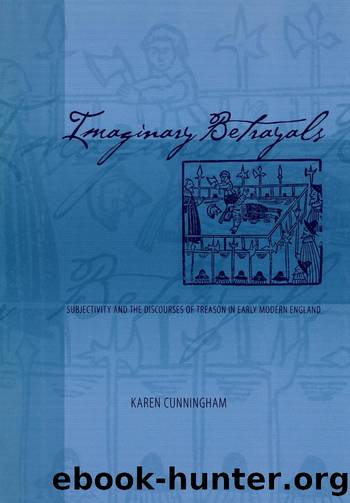Imaginary Betrayals by Cunningham Karen;

Author:Cunningham, Karen;
Language: eng
Format: epub
Publisher: University of Pennsylvania Press
On the one hand, the Bond retrieves the rhetoric of proprietorship common to discourses of treason: it announces a ânaturalâ affiliation with England among the Commissioners, identifying citizenship with a birthplace. Their âbeing natural-born subjects of this realmâ produces, in this logic, an emotion of loyal defense and a predictable character (reiterating Thomas Wilsonâs link between birthplace and criminal or honorable acts in the Arte of Rhetorique). The signers beget an affiliation by subscribing to the same manuscript, and they make loyalty visible by presenting it in documentary form. On and in paper, an abstract England is formed into a shared, physical reality where faithful English men gather and unite in a dispersed yet communal identity. On the other hand, this document is self-conscious about its written status, and its reflexivity highlights its role in bringing about a second Eden. The written bond as document occupies an elusive position; it is partly a transparent conduit to thoughts, and it is partly a materialization in whose substance a transcendent notion of the land inheres and extends over place and time. The association struck herein, the document seems to say, is an effect not only of shared status and geography, but also âperhaps primarilyâan effect of shared discourse, the solidarity it announces, an effect of shared documentary presence.14
Following the Babington prosecutions, Elizabeth authorized a Commission to question Mary: âTo you, and the greater part of you we do give full and absolute power, faculty, and authority⦠to examine all and singular matters compassed and imagined, tending to the hurt of our royal personâ and, further, âto give Sentence or Judgement, as upon good proof matter shall appear unto you.â15 The Commissionersâ authority derived from another unique legal event, a statute (27 Eliz. c.1) entitled âAn act for the Security of the Queenâs Royal Person, and continuance of the realm in peaceâ that affirmed the Bond of Association and specified that the queen could appoint commissioners to interrogate any persons the noblemen might believe to be traitors.16
Cloistered in the halls of Fotheringay, Elizabethâs Commissioners began their interrogation by recapitulating many of the themes that characterize discourses of treason throughout the century: a ruling group adopts a proprietary stance and speaks for âthe realmâ against a âtraitorâ who (from the authoritiesâ perspective) threatens to destroy that countryâs âfelicityâ and to fill its lands with those who are foreigners by birth or by imagination. Before the trial Elizabethâs counselors insisted:
Her Secretaries do write and print, that we be at our witâs end, worldâs end, if she overlive your majesty; meaning thereby, that the end of our world is the beginning of theirsâ¦. [T]his enemy of our felicity seeks to undermine our religion, to supplant us, and plant strangers in the place.17
Download
This site does not store any files on its server. We only index and link to content provided by other sites. Please contact the content providers to delete copyright contents if any and email us, we'll remove relevant links or contents immediately.
The Power of Myth by Joseph Campbell & Bill Moyers(940)
Half Moon Bay by Jonathan Kellerman & Jesse Kellerman(921)
A Social History of the Media by Peter Burke & Peter Burke(888)
Inseparable by Emma Donoghue(855)
The Nets of Modernism: Henry James, Virginia Woolf, James Joyce, and Sigmund Freud by Maud Ellmann(773)
The Spike by Mark Humphries;(730)
A Theory of Narrative Drawing by Simon Grennan(717)
The Complete Correspondence 1928-1940 by Theodor W. Adorno & Walter Benjamin(713)
Ideology by Eagleton Terry;(666)
Bodies from the Library 3 by Tony Medawar(657)
World Philology by(650)
Culture by Terry Eagleton(649)
Farnsworth's Classical English Rhetoric by Ward Farnsworth(648)
Adam Smith by Jonathan Conlin(620)
A Reader’s Companion to J. D. Salinger’s The Catcher in the Rye by Peter Beidler(617)
Game of Thrones and Philosophy by William Irwin(604)
High Albania by M. Edith Durham(599)
Comic Genius: Portraits of Funny People by(588)
Monkey King by Wu Cheng'en(583)
